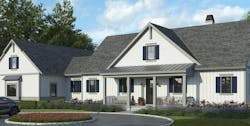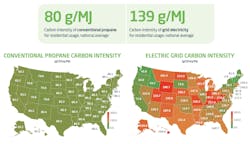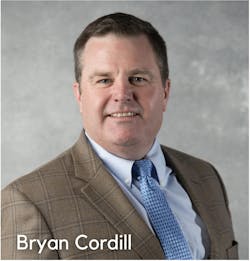Insider Advice on Talking Propane to Achieve Net Zero
The demand for environmentally friendly building is stronger now than ever before. While consumers and even lawmakers think going “all electric” is the answer to a greener and cleaner environment, it’s not. The truth is that most U.S. grid electricity is produced by burning natural gas or coal (60% in 2021). If the demand for electricity increases, the rate at which natural gas and coal is burned also rises. The solution lies in a mix of energy sources like solar, electric, propane, or natural gas to keep communities cleaner.
For homeowners who live off the natural gas grid, there is a clean energy option that is made in the U.S.A. and available right now—propane. When propane systems are coupled with solar systems, a home can achieve net zero energy status. Here are three reasons why you should encourage customers to renovate with an energy mix that includes both propane and solar.
READ MORE: A CASE FOR COMPACT DUCT LAYOUTS
Symbiotic Relationship
Propane is a viable alternative fuel that consumers can use for home and water heating. More than 7.5 million households relied on propane for primary or secondary home heating in 2015. Heating a home with a propane-powered furnace not only is more efficient, but it also produces up to 50% fewer greenhouse gas emissions compared to electric furnaces in residential applications.
Renewable energy systems—like solar or wind—are often combined with a high-efficiency propane system for increased reliability and effectiveness. While a home can run 90% on solar, propane is dependable during the winter months when the house is not getting as many solar rays. Propane on its own is a viable energy solution, and when used with solar power systems, the combination further reduces emissions and increases resiliency.
The House That Blues Built, a custom show home in Massachusetts being built by Albert and Christina Cummings, will include propane as an energy source to help satisfy the increased efficiency standards present in the state's recently installed Stretch Code.
Increased Affordability
Carrino recently completed a renovation on “The Stone House” in upstate New York. The house originally relied on oil. Like many builders, he researched integrating solar and other green energy sources into the home. However, installing solar as the home’s sole energy source wasn’t feasible. “The costs were prohibitive when considering all the other costs during the full gut renovation. Propane proved to be the best balance between cleaner energy and cost effectiveness to achieve the end result of being near net zero.”
Affordability is going to play an increasingly bigger role in renovation decisions, especially as the Federal Reserve attempts to cool inflation and a hot housing market by raising interest rates. While it’s early, the National Association of Realtors is reporting a five-month decline in new home sales. As such, the building industry may see an uptick in renovation projects as homeowners seek to stay in their current house. Homeowners may elect to take advantage of rebates when remodeling. There are several rebates and offers for solar panels and for propane systems. Rebates and credits from state energy offices and state propane gas associations can make high-efficiency propane-powered heating and water heating systems more cost effective. Current propane incentives and offers are listed at Propane.com.
Doing right by the environment doesn’t mean spending more. When a house has more propane appliances, there are fewer appliances that need the energy captured from the solar panels. As a result, your customers will need a smaller solar system (panels and battery storage), increasing its affordability. Hybrid systems that run on propane and solar can be tailored to a project’s unique needs, providing reduced energy costs and lowered emissions.
Reliable Energy
Consumers are looking to invest in alternate power solutions, like solar and propane, due to the unreliable electric grid. In 2021, more than 8.6 million people experienced a power interruption according to the U.S. Department of Energy (DOE). Dr. Gokul Vishwanathan, Director of Research and Sustainability at the Propane Education & Research Council recently published “Power Generation: The Emissions Shifting Problem” an in-depth look at the increase of diesel generator sales and its exacerbating local air quality concerns. Findings show residential customers are responding to the increased power outages by investing upwards of $20,000 in diesel generators. As builders, it’s time to rethink the systems installed in homes that can operate on propane.
A house that runs on propane, solar, and batteries now has three energy options to draw from when power outages occur creating a safer home for your customers.
Electrifying everything is not the answer to a greener tomorrow. Plus, it will take decades and trillions of dollars to overhaul the current electric grid to ensure it is clean and reliable. It’s time for builders to rethink a zero net energy home by choosing diverse low-carbon, renewable energy mix like propane and solar power.
Bryan Cordill is director of residential and commercial business development for the Propane Education & Research Council. He can be reached at [email protected].




